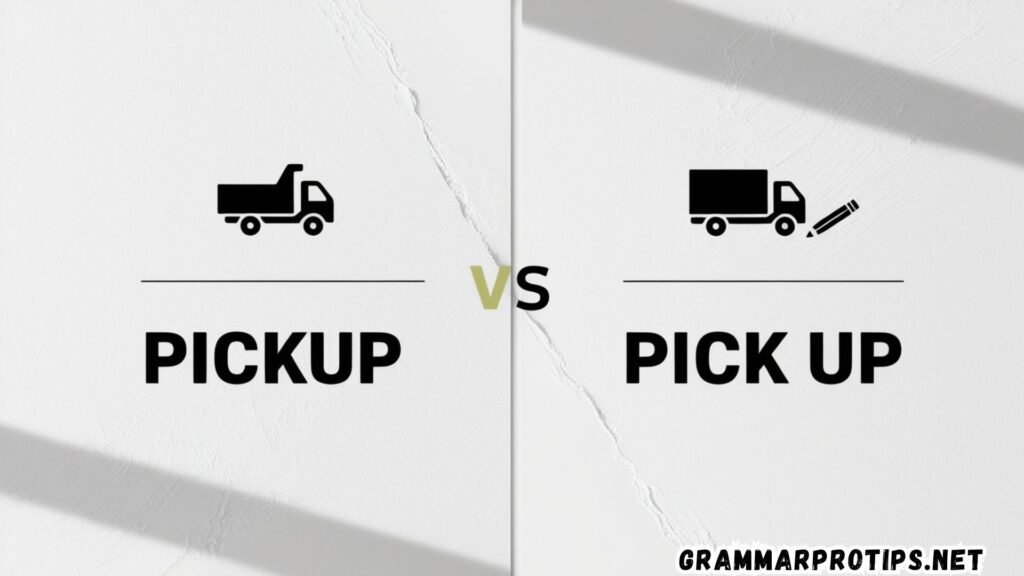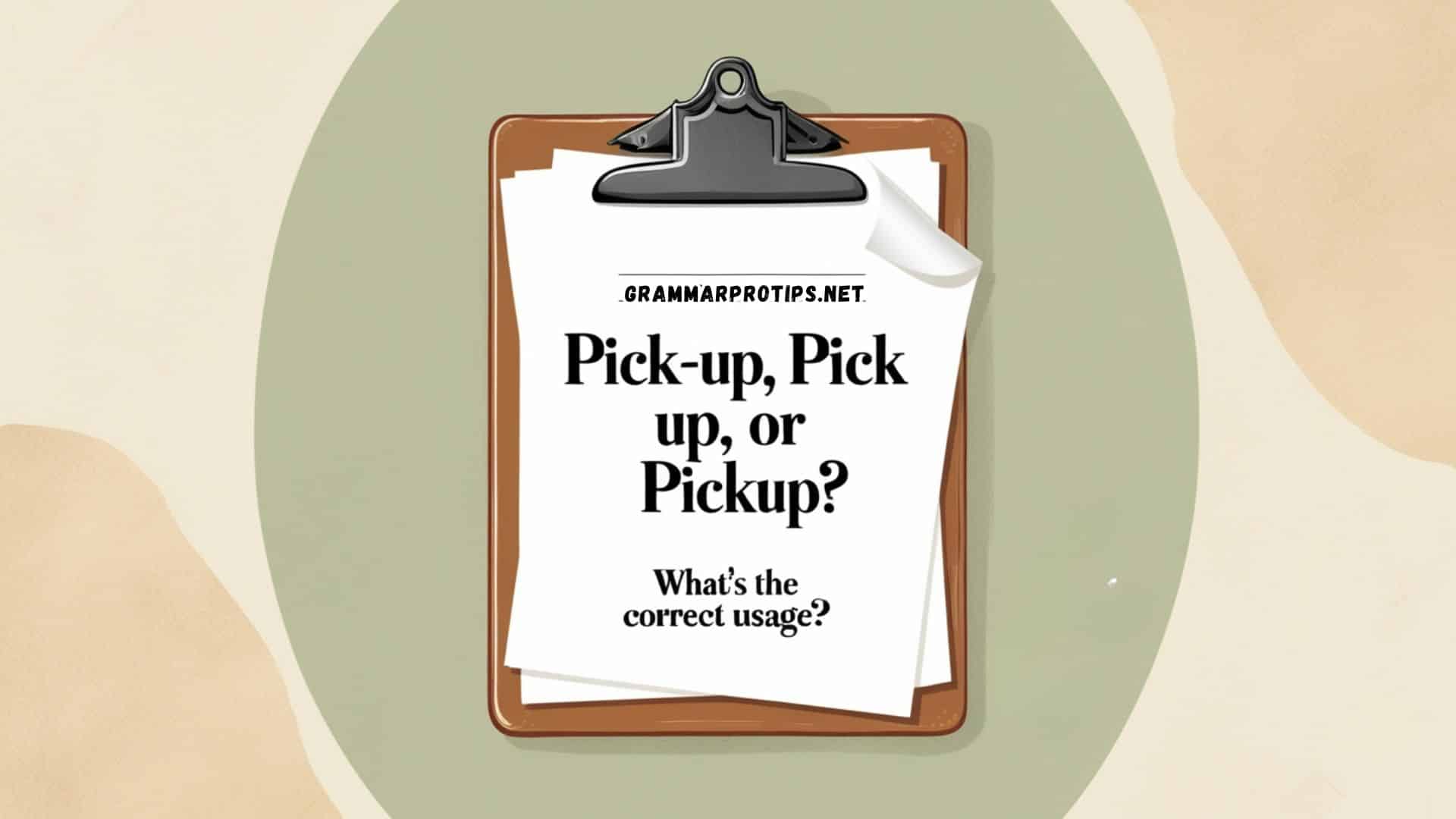The English language can be a tricky one, especially when it comes to certain words or phrases that sound similar but have different spellings or uses. One such example is the confusion surrounding the terms “pick up,” “pick-up,” and “pickup.” These variations are often misunderstood or used interchangeably, but they do have specific rules about how they should be used in different contexts.
In this article, we’ll explore the differences between these terms, provide real-world examples, and help you understand when to use each one. By the end, you’ll have a clear understanding of pick up vs pickup, pick up or pickup, and other related phrases. Let’s dive in!
What Does “Pick Up” Mean?
The phrase “pick up” is a verb phrase that refers to the action of lifting, collecting, or acquiring something. It can be used in a variety of contexts, both literally and figuratively.
Examples of “Pick Up”:
- Literally: “I will pick up the groceries from the store.”
- Figuratively: “He needs to pick up his pace if he wants to finish the project on time.”
In most cases, “pick up” is a phrasal verb, which means it consists of a verb (“pick”) and a preposition or adverb (“up”). It’s important to note that “pick up” is generally not hyphenated unless it’s part of a compound adjective.
Email Example Using “Pick Up”
Subject: Pick Up Your Order
Dear Sarah,
I wanted to confirm that your order is ready for pick up. You can collect it from our store anytime between 9 AM and 5 PM today. Please let me know if you need any further assistance.
Best regards,
Tom
In this email, “pick up” refers to the act of collecting the order from the store.

What About “Pick-Up”?
“Pick-up” is a compound noun that refers to the act of picking something up or the location where something is picked up. It can also describe a service or event related to the process of collecting things.
Examples of “Pick-Up”:
- “The pick-up service will arrive at 2 PM.”
- “The pick-up point for the shuttle is at the front gate.”
“Pick-up” is typically used when you’re referring to a noun, and it’s hyphenated to indicate that it functions as a single unit. You might also encounter this term when talking about transportation services or collection points.
Email Example Using “Pick-Up”
Subject: Pick-Up Schedule for Your Package
Hi Jason,
Your package is ready for pick-up at our main office. Please visit us during our working hours, and don’t forget to bring your ID for verification.
We look forward to seeing you soon!
Best,
Emily
In this example, “pick-up” refers to the noun that describes the service or location where Jason will collect his package.
When Should You Use “Pickup”?
“Pickup” is a single word and is primarily used as a noun or an adjective. It describes the action or the event of collecting or gathering things, much like “pick-up,” but without the hyphen.
Examples of “Pickup”:
- “The pickup was delayed due to traffic.”
- “We have a pickup scheduled for tomorrow morning.”
- “The pickup truck is parked outside.”
“Pickup” works well in situations where you need a streamlined, single-word noun. This is particularly true when referring to services, like in customer support or transportation. When describing an event or a location, this term is often used in an informal or shorthand way.
Email Example Using “Pickup”
Subject: Your Pickup Has Been Rescheduled
Hi Mark,
Due to unforeseen circumstances, your pickup has been rescheduled for 3 PM tomorrow. We apologize for any inconvenience caused. Please let us know if this new time works for you.
Best regards,
Claire
In this email, “pickup” refers to the event of collecting something and is used as a noun.
How to Decide: Pick Up vs Pickup
When deciding between “pick up” and “pickup,” remember these key points:
- Use pick up when referring to the action or the process of gathering or collecting something.
- Use pickup as a noun to describe the event or location where something will be collected.
- Use pick-up when you need a hyphenated compound noun, especially when the term refers to a service or event (e.g., “The pick-up service was prompt”).
Here’s a simple table that summarizes the differences:
| Term | Part of Speech | Example | Context |
|---|---|---|---|
| Pick Up | Verb (phrasal) | I need to pick up my clothes from the dry cleaners. | Action or process of collecting something |
| Pick-Up | Noun | The pick-up will take place at 2 PM. | Event or service (often hyphenated) |
| Pickup | Noun/Adjective | The pickup was scheduled for noon. | A scheduled event or a descriptive term |
Pick Up or Pick-Up: Which One is Correct?
The choice between “pick up” and “pick-up” depends on how you are using the term.
- Pick up is the preferred form when you are describing an action. For example: “I will pick up the package.”
- Pick-up is used when the phrase is functioning as a noun. For example: “Please proceed to the pick-up location.”
In general, pick-up with a hyphen is less common in informal writing. However, in formal contexts or technical writing, it’s more common to see it used to describe services or actions that require clarity.

Pickup or Pick Up: Which is Better?
The confusion often comes when deciding between pickup vs pick up. As mentioned earlier, the general rule is:
- Pick up: Use it when you refer to the action or verb phrase.
- Pickup: Use it as a noun or when referring to a scheduled event or service.
Example Scenarios:
Scenario 1: Personal Action
- “I will pick up the children after school.”
In this sentence, “pick up” is used as a verb phrase to describe the action of collecting the children.
Scenario 2: Service or Event
- “The pickup is scheduled for 4 PM.”
Here, “pickup” refers to a service event and is used as a noun.
Why the Confusion?
The English language loves to make things tricky. So why are these terms often mixed up?
- Phrasal Verbs: Many people mistakenly treat “pick up” as a noun, but it’s a verb phrase. The confusion arises when the noun form is created with “pickup.”
- Regional Differences: In some regions, the hyphenated “pick-up” may be more common, while in others, “pickup” is favored.
- Simplified Usage: People tend to drop hyphens in casual writing, leading to the widespread use of “pickup” as a catch-all term, which can cause further confusion.
Final Thoughts
To sum it up:
- Pick up is for the action.
- Pick-up is for the noun (with a hyphen).
- Pickup is a noun without the hyphen, often used for events or services.
Keep in mind these rules when writing or speaking, and you’ll soon get the hang of using the correct form! The goal is to be as clear and precise as possible when communicating, and understanding the subtle differences between these terms will help you do just that.
If you’re still unsure about the proper usage, don’t hesitate to check the context in which you’re writing. Whether you’re composing an email, creating a form, or drafting a memo, knowing when to use pick up vs pickup will ensure your language remains both professional and effective.

Sienna Mauldon is a passionate writer and grammar expert. On her blog, she shares easy-to-follow guides to help readers master grammar rules and improve their writing. With a love for language and teaching, Sienna makes grammar simple and fun for everyone, from beginners to experienced writers.








